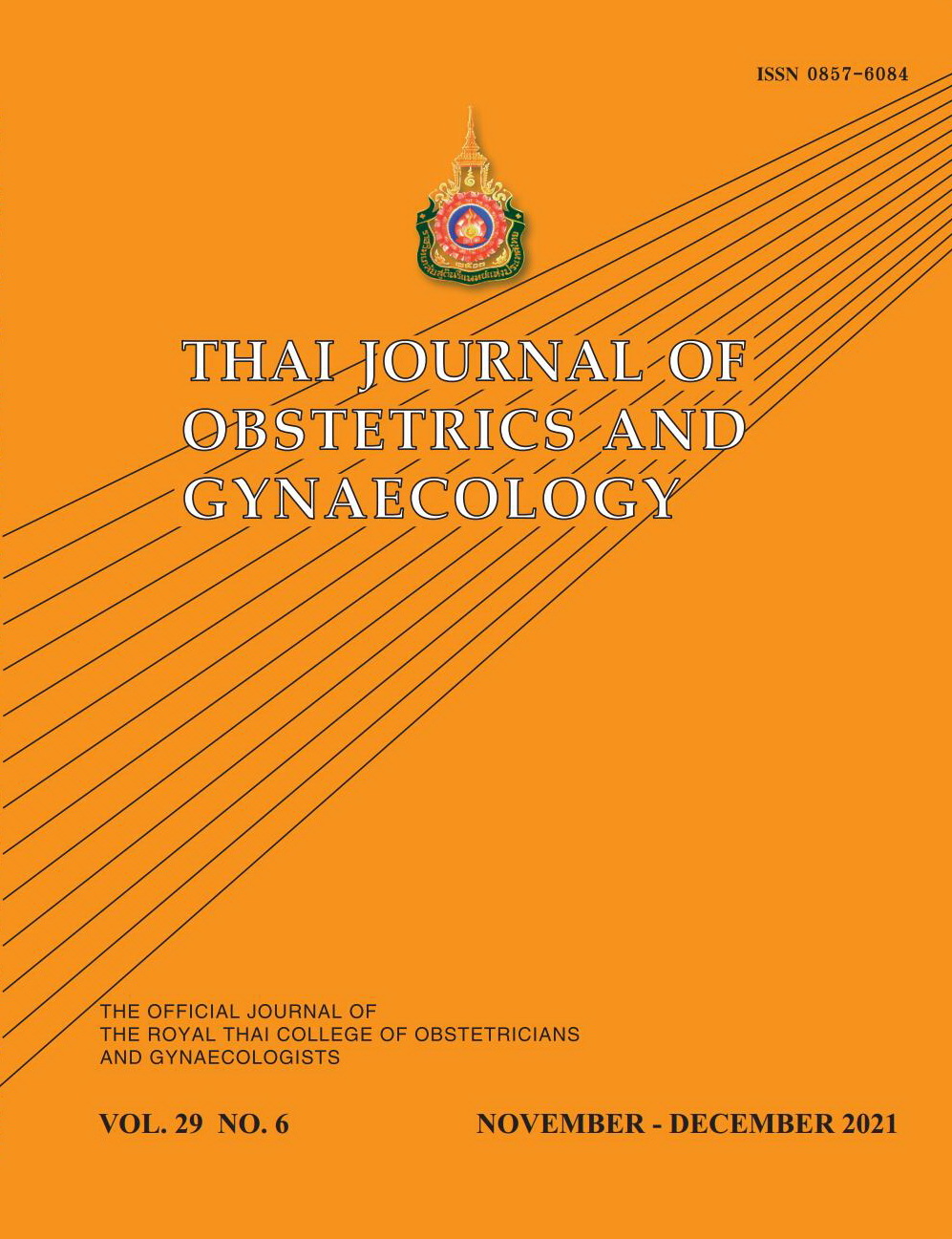Incidence of early postpartum mastitis with the predisposing factors, the recovery period after care management and the exclusive breastfeeding outcomes
Main Article Content
Abstract
Objective: To investigate the incidence of early postpartum mastitis, the predisposing factors, the recovery period and the exclusive breastfeeding outcomes at the one month postpartum period.
Materials and Methods: Singleton, postpartum women without complications and had at least 6 months of breastfeeding intent were recruited. Demographic data and the predisposing factors, the number of mastitis incidences, the recovery periods and exclusive breastfeeding rates were recorded and followed up during a one month period. If mastitis was diagnosed, mothers were advised to breastfeed frequently, apply hot compresses and to express milkLAntibiotics were only used in suspected infective mastitis. At the one-month follow-up, the breastfeeding data was collected from the subjects’ breastfeeding record forms and analyzed.
Results: The data from 1025 postpartum mothers were collected for analyses, 950 mothers without and 75 with mastitis. Non-infective and infective mastitis was found in 65.3% and 34.7% of all mastitis cases, respectively. Relative risks of mastitis for cesarean section deliveries were 2.0 (95%CI = 1.3-3.2), being overweight 1.6 (95%CI = 1.2-2.3), delayed breastfeeding initiation of more than 6 hours 2.2 ((95%C =1.4-3.1) and a previous history of mastitis 6.1 (95%CI = 2.1-18.0). Most mothers with mastitis had a one-week recovery period for non-infective (73.5%) and two-weeks of recovery for infective mastitis (69.2%). Relative risks of exclusive breastfeeding for mastitis was 0.5 (95%CI = 0.3-0.8).
Conclusion: The incidence of early postpartum mastitis was 7.3%. Factors associated with milk stasis resulting from the delayed initiation of breastfeeding may be one cause of mastitis in early postpartum. Therefore, supporting early breastfeeding initiation practice could prove beneficial in the prevention of mastitis and improve breastfeeding outcomes.
Article Details
References
2. Khanal V, Scott JA, Lee AH, Binns CW. Incidence of Mastitis in the Neonatal Period in a Traditional Breastfeeding Society: Results of a Cohort Study. Breastfeed Med 2015;10:481-7.
3. Foxman B, Schwartz K, Looman SJ. Breastfeeding practices and lactation mastitis. Soc Sci Med 1994;38:755-61.
4. Spencer JP. Management of mastitis in breastfeeding women. Am Fam Physician 2008;78:727-31.
5. Kvist LJ. Re-examination of old truths: replication of a study to measure the incidence of lactational mastitis in breastfeeding women. Int Breastfeed J 2013;8:2.
6. Amir LH. ABM clinical protocol #4: Mastitis, revised March 2014. Breastfeed Med 2014;9:239-43.
7. Mediano P, Fernandez L, Rodriguez JM, Marin M. Case-control study of risk factors for infectious mastitis in Spanish breastfeeding women. BMC Pregnancy Childbirth 2014;14:195.
8. Kinlay JR, O'Connell DL, Kinlay S. Risk factors for mastitis in breastfeeding women: results of a prospective cohort study. Aust N Z J Public Health 2001;25:115-20.
9. Albokhary AA, James JP. Does cesarean section have an impact on the successful initiation of breastfeeding in Saudi Arabia? Saudi Med J 2014;35:1400-3.
10. Wallenborn JT, Graves WC, Masho SW. Breastfeeding Initiation in Mothers with Repeat Cesarean Section: The Impact of Marital Status. Breastfeed Med 2017;12:227-32.
11. Azzeh FS, Alazzeh AY, Hijazi HH, et al. Factors Associated with Not Breastfeeding and Delaying the Early Initiation of Breastfeeding in Mecca Region, Saudi Arabia. Children (Basel) 2018;5.
12. Donath SM, Amir LH. Maternal obesity and initiation and duration of breastfeeding: data from the longitudinal study of Australian children. Matern Child Nutr 2008;4:163-70.
13. Mehta UJ, Siega-Riz AM, Herring AH, Adair LS, Bentley ME. Maternal obesity, psychological factors, and breastfeeding initiation. Breastfeed Med 2011;6:369-76.


